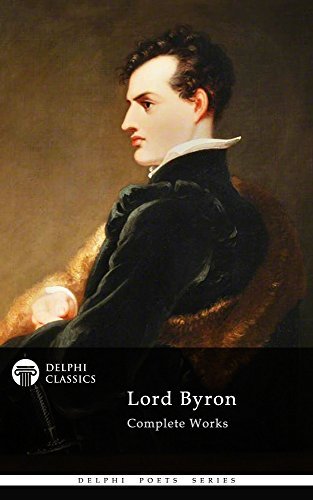What do you think?
Rate this book


4911 pages, Kindle Edition
First published December 1, 1901
"Ah! gentle, fleeting, wav’ring sprite, Friend and associate of this clay! To what unknown region borne, Wilt thou now wing thy distant flight? No more with wonted humour gay, But pallid, cheerless, and forlorn."
"When age chills the blood, when our pleasures are past — For years fleet away with the wings of the dove — The dearest remembrance will still be the last, Our sweetest memorial the first kiss of love."
"Ah, Spain! how sad will be thy reckoning day, When soars Gaul’s Vulture, with his wings unfurled, And thou shalt view thy sons in crowds to Hades hurled." CHP: Canto First, LII
"Whate’er betides, I’ve known the worst. What is that worst? Nay, do not ask - In pity from the search forbear: Smile on - nor venture to unmask Man’s heart, and view the hell that’s there" CHP: To Inez
"Blood follows blood, and through their mortal span, In bloodier acts conclude those who with blood began." CHP: Canto Second, LXIII
"A thousand years scarce serve to form a state; An hour may lay it in the dust: and when Can man its shattered splendour renovate, Recall its virtues back, and vanquish Time and Fate?" CHP: Canto Second, LXXXIII
"Death in the front, Destruction in the rear!" CHP: Canto Second, XC
"And none are left to please where none are left to love." CHP: Canto Second, XCIV
"Oh! ever loving, lovely, and beloved!" CHP: Canto Second, XCVI
"What is the worst of woes that wait on age? What stamps the wrinkle deeper on the brow? To view each loved one blotted from life’s page, And be alone on earth, as I am now. Before the Chastener humbly let me bow, O’er hearts divided and o’er hopes destroyed: Roll on, vain days! full reckless may ye flow, Since Time hath reft whate’er my soul enjoyed, And with the ills of eld mine earlier years alloyed." CHP: Canto Second, XCVIII
"He who ascends to mountain-tops, shall find The loftiest peaks most wrapt in clouds and snow; He who surpasses or subdues mankind, Must look down on the hate of those below. Though high above the sun of glory glow, And far beneath the earth and ocean spread, Round him are icy rocks, and loudly blow Contending tempests on his naked head," CHP: Canto Third, XLV
"Earth paved like Heaven; and to seem such to me." CHP: Canto Third, L
"I send the lilies given to me; Though long before thy hand they touch, I know that they must withered be, But yet reject them not as such; For I have cherished them as dear, Because they yet may meet thine eye, And guide thy soul to mine e’en here, When thou behold’st them drooping nigh, And know’st them gathered by the Rhine, And offered from my heart to thine!" CHP: Canto Third, LV
"The sky is changed! - and such a change! O night, And storm, and darkness, ye are wondrous strong, ... Leaps the live thunder! Not from one lone cloud, But every mountain now hath found a tongue;" CHP: Canto Third, XCII
"All things are here of him; from the black pines, Which are his shade on high, and the loud roar Of torrents, where he listeneth, to the vines Which slope his green path downward to the shore, Where the bowed waters meet him, and adore," CHP: Canto Third, CI
"I stood in Venice, on the Bridge of Sighs; A palace and a prison on each hand: I saw from out the wave her structures rise As from the stroke of the enchanter’s wand: CHP: Canto Fourth, I"
"The thorns which I have reaped are of the tree I planted, - they have torn me, and I bleed: I should have known what fruit would spring from such a seed." CHP: Canto Four, X